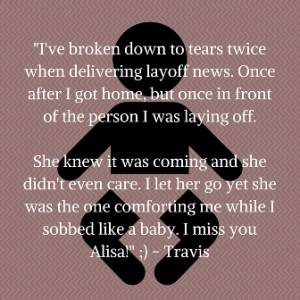Layoff, Reduction in Force (RIF), Rightsizing
However presented, it’s ugly and your final check is on its way. A not-so-happy hour starts early that day.
We Regret to Inform You
I’ve delivered and received the news. It sucks for everyone, but someone leaves that discussion wondering what to do next.
It happens all the time. Companies are forced to make tough, difficult, and hard decisions to preserve a bright future. Things are so close to getting better. The people left are there for a reason. At least, that’s what they will tell whoever is left.
That’s what we told people. Most of the time, we believed it. However, there comes a time when you know the ship isn’t coming back to port.
I managed an HR department for 15 years and I’ve delivered the news more times than I care to think about. I hated it each and every time. It was never easy.
Eventually, we were acquired and accepted positions with the new company.
April 13, 2015
Nearly a year later, the tables were turned, and I was laid off. Over 30 people were let go that day.
My manager didn’t tell me; he was already gone. In fact, my former business partner of 15 years, and great friend, had to escort me to the room. Then, he escorted me out of the building.
For the first time in my adult life, I left the office without work responsibilities.
I was confused, but I can’t say I was surprised. The signs were there. Companies sometimes have a hard time keeping the writing off the proverbial wall. It’s usually not a secret when a company isn’t selling anything. People get nervous. This is rocket fuel for workplace gossip.
The ‘when’ is usually unclear. One day, it just happens. Every company handles it differently, but the message is the same: You do not have a job.
Some companies announce them ahead of time. Some just do it.
The following are my own insights and observations based on having been on both sides of a RIF. I am not a lawyer and this is not legal advice. These are things you might care to know if it happens to you.
Unless you’re first, you won’t be surprised. As coordinated as an employer tries to be, there’s no telling what happens once it starts. Word gets out after the first person is let go. Speculation ensues. You are not safe until you attend the “everyone who survived is here for a reason” meeting.
Don’t expect an apology or empathy. The process can be stoic and impersonal. You might see glimpses of humanity in someone on the employer side, but there are things they are advised not to say. Things like, “I’m sorry” or “I wish it were different.” The employer’s goal is to treat everyone consistently.
HR is only on your side so much as they are there to make sure the company doesn’t do anything wrong during the process. They are prepared and/or been coached. They are watching your every move and listening to everything you say. They already have a lawyer. One might be there, quietly observing, waiting to slide paperwork your way.
Keep your emotions in check. Do not say anything negative. Many thoughts will cross your mind; keep them to yourself. This is that window when you might say something you will regret. Now is not the time to risk sounding disgruntled.
Review any paperwork at home after the fact. You’re not required to sign anything that day. You will be given a packet explaining, in a lot of words, what just happened. More importantly, it will cover loose ends regarding pay and benefits. You’d like to think everything is accurate, but take time to thoroughly read this packet.
Once you have been let go, they don’t want you there any more than you want to be there. Say “thank you” and ask them to clarify the date they need the packet returned.
Say goodbye to your equipment. When you leave, you might never see your equipment again. Plan on leaving with your keys and dignity. If you cross pollinate business and pleasure on your work laptop, you better be backing up your personal files as a matter of habit.
Always keep a copy of your current employment manual at home. This is particularly important regarding policies explaining any severance, final pay and compensation, retirement plans, reimbursements, unused paid time off or vacation, insurance continuation, and any other relevant items concerning your separation from the company.
It’s not illegal for a company to trick you. While you would like to think it wouldn’t happen, the company can put something in front of you that bends the rules. Don’t simply believe what they have told you or presented.
Every state has its own employment laws. State laws might trump company policy or point back to company policy. It’s worth a few minutes of research to keep the company honest. There are free online resources for employment laws in each state. This is where my HR background was beneficial. What was put in front of me versus what was required by law were two different things . Once I brought this to their attention, they corrected the item immediately. I didn’t even need a lawyer for this. They knew what they were doing. It was a game move. It’s business.
If you feel your termination is wrongful, that’s a discussion between you and your lawyer. Do not make any threats or accusations while you are being laid off. That’s my recommendation. Your situation is your situation.
“Financial reasons” is hard to make a case against. You cost money and they can’t pay you and you can’t work for free. If the financial statement shows a loss, any job is on the line. The company’s CEO could be mired in HR allegations while losing money month-after-month and you can still be escorted out.
Remember, your goal that day is to not act inappropriately. It can feel personal, but it’s not. At least, it shouldn’t be. The decision is final. The discussions and debates have already occurred.
Only your job ends there. It could be the best thing that’s ever happened to you. That doesn’t mean you are going to like it that day.
 Copyright secured by Digiprove © 2015-2018
Copyright secured by Digiprove © 2015-2018 


